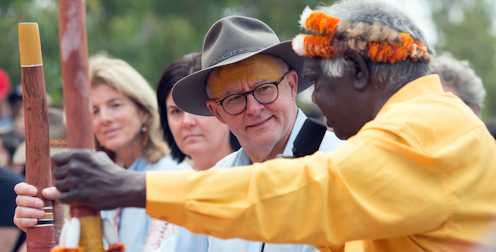Albanese releases draft wording for Indigenous 'Voice to parliament' referendum
- Written by Michelle Grattan, Professorial Fellow, University of Canberra

Anthony Albanese will propose draft wording to insert into the constitution an Indigenous “Voice” to parliament when he addresses the Garma Festival in Arnhem Land on Saturday.
The Prime Minister is also releasing a draft of the question that would be put to the people at the referendum for the change.
The new provision in the constitution would have three sentences:
There shall be a body, to be called the Aboriginal and Torres Strait Islander Voice
The Aboriginal and Torres Strait Islander Voice may make representations to Parliament and the Executive government on matters relating to Aboriginal and Torres Strait Islander Peoples
The Parliament shall, subject to this Constitution, have power to make laws with respect to the composition, functions, powers and procedures of the Aboriginal and Torres Strait Islander Voice.
In his speech, released ahead of delivery, Albanese says this might not be the final form of words but it is the next step in the discussion.
His draft referendum question would ask: “Do you support an alteration to the Constitution that establishes an Aboriginal and Torres Strait Islander Voice?”
To pass, a referendum needs to win both an overall majority of votes as well as majorities in a majority of states. There have been 44 proposals for constitutional change put in 19 referendums with only eight changes passing.
Although Albanese has been anxious for the referendum to be held next year, he talks in his speech only of having it in the current parliamentary term.
“I believe the country is ready for this reform,” he says. “I believe there is room in Australian hearts for the [Uluru] Statement from the Heart.”
“We are seeking a momentous change – but it is also a very simple one.”
“It is not a matter of special treatment, or preferential power. It’s about consulting Aboriginal and Torres Strait Islander peoples on the decisions that affect you. This is simple courtesy, it is common decency.”
Albanese says that putting a Voice into the constitution “means a willingness to listen won’t depend on who is in government or who is prime minister”. Such a Voice “cannot be silenced”.
“The Voice will exist and endure outside of the ups and downs of election cycles and the weakness of short-term politics.
"It will be an unflinching source of advice and accountability.”
It would not be a “third chamber” but “a body with the perspective and the power and the platform to tell the government and the parliament the truth about what is working and what is not”.
Albanese says the “best way to seize the momentum” is to settle on the proposed referendum question as soon as possible.
“I ask all Australians of goodwill to engage on this,” Albanese says.
“Respectfully, purposefully we are seeking to secure support for the question and the associated provisions in time for a successful referendum, in this term of parliament.
"This is a reform I believe every Australian can embrace, from all walks of life, in every part of the country, from every faith and background and tradition.
"Because it speaks to values we all share and honour – fairness, respect, decency.”
Albanese says while there may be fear campaigns to counter, perhaps the greatest threat to success is indifference – the notion this is symbolism without practical benefit, or that advocating for a Voice is at the expense of expanding economic opportunity or improving conditions.
“Let us all understand: Australia does not have to choose between improving peoples’ lives and amending the constitution. We can do both – and we have to.”
Issues of life expectancy, incarceration, disease and other problems would get worse if “governments simply continue to insist they know better”.
Authors: Michelle Grattan, Professorial Fellow, University of Canberra





